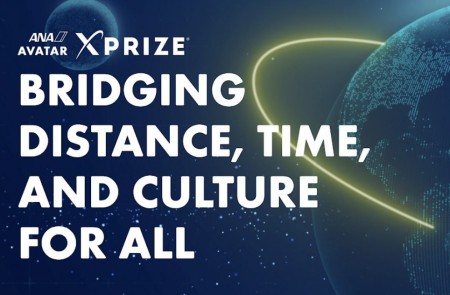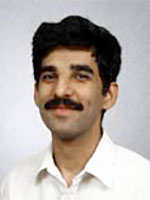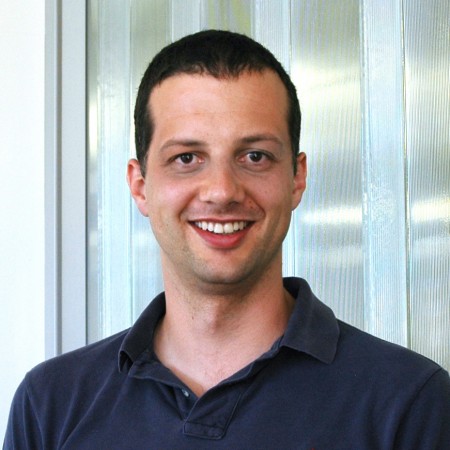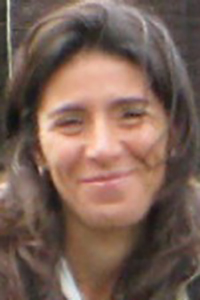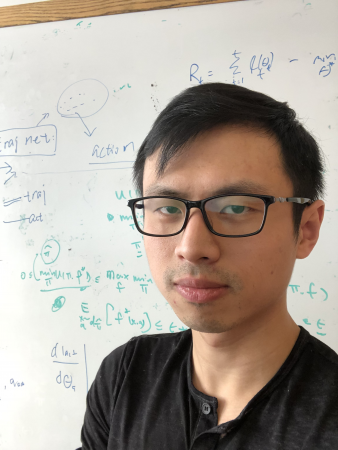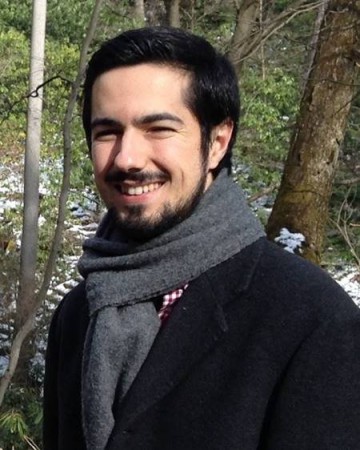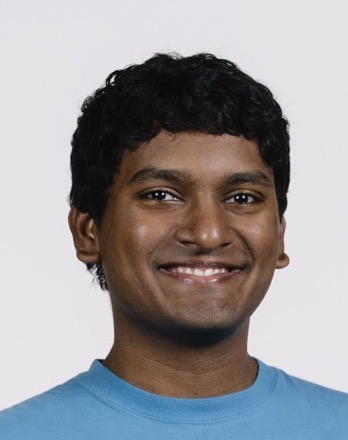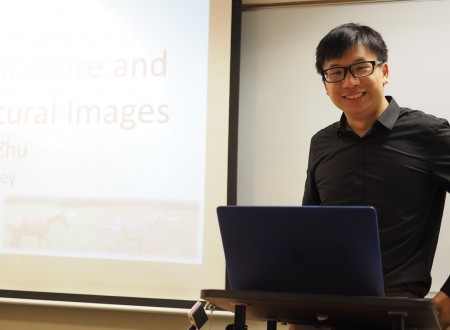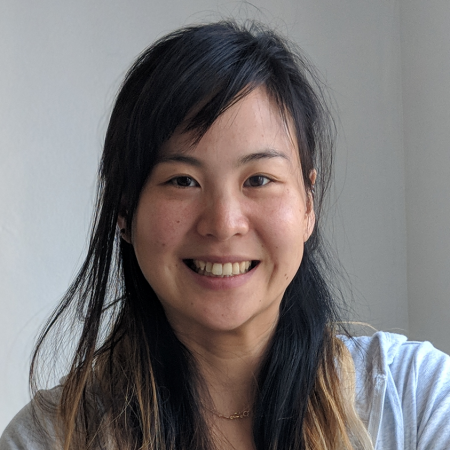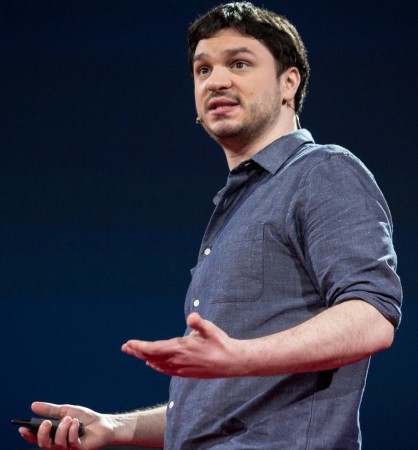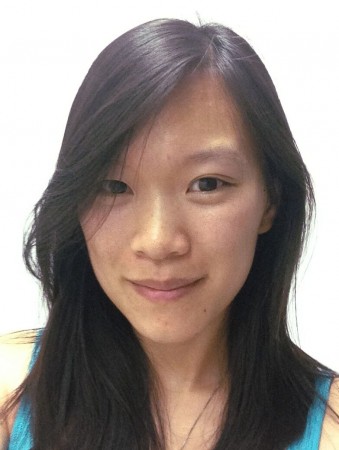ANA Avatar XPRIZE BRIDGING DISTANCE, TIME, AND CULTURE FOR ALL
"Calling all Carnegie Mellon inventors, creators, and scientists. Are you studying robotics, computer science, psychology, sociology, virtual immersion, sensor technologies, haptics, artificial intelligence or thinking about inventing the future? Have you ever wondered what it would be like to transport your consciousness to another part of the world, and be able to feel the place [...]
Factor Graphs for Robot Perception
Abstract: Factor graphs have become a popular tool for modeling robot perception problems. Not only can they model the bipartite relationship between sensor measurements and variables of interest for inference, but they have also been instrumental in devising novel inference algorithms that exploit the spatial and temporal structure inherent in these problems. I will overview [...]
Carnegie Mellon University
Scaling up Self-Supervision for Robot Learning
Abstract: A general purpose robot will need to interact with objects in cluttered environments with minimal supervision. Machine learning provides methods that can deal with these complex tasks without explicitly modelling the environment. More recently, deep learning techniques combined with large scale data has revolutionized the fields of computer vision, language processing and reinforcement learning. [...]
Towards better methods of video generation
Abstract: Learning to generate future frames of a video sequence is a challenging research problem with great relevance to reinforcement learning, planning and robotics. Existing approaches either fail to capture the full distribution of outcomes, or yield blurry generations, or both. In this talk I will address two important aspects of video generations: (i) what [...]
Carnegie Mellon University
Safe Data Gathering in Physical Spaces
Abstract: Reliable and efficient acquisition of data from physical spaces has widespread applications in industry, policy, defense, and humanitarian work. Unmanned Aerial Vehicles (UAVs) are an excellent choice for data gathering applications, due to their capability of gaining information at multiple scales. A robust data gathering system needs to reason about multi-resolution nature of information [...]
Robotics Institute Faculty Social
All Robotics Institute faculty are invited to attend these informal team-building business/social events. Beverages and snacks will be provided.
Light-Sensitive Displays
Abstract: Nobel prize winner M. G. Lippmann described his dream of an ideal display as a “window into the world.” “While the current most perfect photographic print only shows one aspect of reality, reduced to a single image fixed in a plane, the direct view of reality offers, as we know, infinitely more variety.” Changing [...]
Acquiring and Transferring Generalizable Vision-based Robot Skills
Abstract: In recent years, there have been great advances in policy learning for goal-oriented agents. However, there are still major challenges brought by real-world constraints for teaching highly generalizable and versatile robot policies in a cost efficient and safe manner. In this talk, I will argue that instead of aiming to teach large motion repertoires [...]
Carnegie Mellon University
Robot Learning in Homes – Improving Generalization and Reducing Dataset Bias
Abstract: Data-driven approaches to solving robotic tasks have gained a lot of traction in recent years. However, most existing policies are trained on large-scale datasets collected in curated lab settings. If we aim to deploy these models in unstructured visual environments like people’s homes, they will be unable to cope with the mismatch in data [...]
Learning to localize and anonymize objects with indirect supervision
Abstract: Computer vision has made great strides for problems that can be learned with direct supervision, in which the goal can be precisely defined (e.g., drawing a box that tightly-fits an object). However, direct supervision is often not only costly, but also challenging to obtain when the goal is more ambiguous. In this talk, I [...]
What People See in a Robot: A New Look at Human-Like Appearance
Abstract: A long-standing question in HRI is what effects a robot’s human-like appearance has on various psychological responses. A substantial literature has demonstrated such effects on liking, trust, ascribed intelligence, and so on. Much of this work has relied on a construct of uni-dimensional low to high human-likeness. I introduce evidence for an alternative view according to which [...]
Safe Learning in Robotics
Abstract: A great deal of research in recent years has focused on robot learning. In many applications, guarantees that specifications are satisfied throughout the learning process are paramount. For the safety specification, we present a controller synthesis technique based on the computation of reachable sets, using optimal control and game theory. In the first part [...]
Carnegie Mellon University
Online, Interactive User Guidance for High-dimensional, Constrained Motion Planning
Abstract: We consider the problem of planning a collision-free path for a high-dimensional robot. Specifically, we suggest a planning framework where a motion-planning algorithm can obtain guidance from a user. In contrast to existing approaches that try to speed up planning by incorporating experiences or demonstrations ahead of planning, we suggest to seek user guidance [...]
RI Faculty Social
All Robotics Institute faculty are invited to attend this informal team-building business/social event. Beverages and snacks will be provided.
Carnegie Mellon University
MRFMaps: A Representation for Multi-Hypothesis Dense Volumetric SLAM
Abstract: Robust robotic flight requires tightly coupled perception and control. Conventional approaches employ a SLAM algorithm to infer the most likely trajectory and then generate an occupancy grid map using dense sensor data for planning purposes. In such approaches all the robustness and accuracy costs are offset to the SLAM algorithm; if there are any [...]
Carnegie Mellon University
Learning to learn from simulation: Using simulations to learn faster on robots
Abstract: Learning for control is capable of acquiring controllers in novel task scenarios, paving the path to autonomous robots. However, typical learning approaches can be prohibitively expensive in terms of robot experiments, and policies learned in simulation do not transfer directly due to modelling inaccuracies. This encourages learning information from simulation that has a higher [...]
Bipolar Robotics – From the Arctic to the Antarctic with a stop for Fisheries in the middle latitudes.
Abstract: The Arctic, Antarctic and Greenland remain some of the least explored parts of the planet. This talk looks at efforts over the last decade to explore areas under-ice which have traditionally been difficult to access. The focus of the talk will be on the robots, the role of communications over low bandwidth acoustic links, [...]
Video Compression for Recognition & Video Recognition for Compression
Abstract: Training robust deep video representations has proven to be much more challenging than learning deep image representations. One reason is: videos are huge and highly redundant. The 'true' and interesting signal often drowns in too much irrelevant data. In the first part of the talk, I will show how to train a deep network [...]
Multimodal Computational Behavior Understanding
Emotions influence our lives. Observational methods of measuring affective behavior have yielded critical insights, but a persistent barrier to their wide application is that they are labor-intensive to learn and to use. An automated system that can quantify and synthesize human affective behavior in real-world environments would be a transformational tool for research and for [...]
Learning Robot Manipulation Skills through Experience and Generalization
Abstract: In the future, robots could be used to take care of the elderly, perform household chores, and assist in hazardous situations. However, such applications require robots to manipulate objects in unstructured and everyday environments. Hence, in order to perform a wide range of tasks, robots will need to learn manipulation skills that generalize between [...]
Fully Autonomous Drones for Wind Power Turbine Inspection
Abstract: The wind energy industry is growing rapidly. In the U.S. alone, the wind industry invested more than $11 billion in new plants in 2017 and added more than 7,000 megawatts of new capacity, representing 25% of all electric capacity added. One of the biggest challenges to growth remains the high costs of constructing wind [...]
Signal to Symbol (via Skills)
Abstract: While recent years have seen dramatic progress in the development of affordable, general-purpose robot hardware, the capabilities of that hardware far exceed our ability to write software to adequately control. The key challenge here is one of abstraction: generally capable behavior requires high-level reasoning and planning, but perception and actuation must ultimately be performed [...]
Carnegie Mellon University
Sparse and Dense Methods for Underwater Localization and Mapping with Imaging Sonar
Abstract: Imaging sonars have been used for a variety of tasks geared towards increasing autonomy of underwater vehicles: image registration and mosaicing, vehicle localization, object recognition, mapping, and path planning, to name a few. However, the complexity of the image formation has led many algorithms to make the restrictive assumption that the scene geometry is [...]
Carnegie Mellon University
Deep Interpretable Non-rigid Structure from Motion
Abstract: Current non-rigid structure from motion (NRSfM) algorithms are limited with respect to: (i) the number of images, and (ii) the type of shape variability they can handle. This has hampered the practical utility of NRSfM for many applications within vision. Deep Neural Networks (DNNs) are an obvious candidate to help with such issue. However, [...]
RI Faculty Social All Robotics Institute faculty are invited to attend this informal team-building business/social event
All Robotics Institute faculty are invited to attend this informal team-building business/social event. Our November Robotics Institute Faculty Social will be hosted by Martial Hebert in NSH 4305, from 3:00 to 4:00pm.
Carnegie Mellon University
Autonomous drone cinematographer: Using artistic principles to create smooth, safe, occlusion-free trajectories for aerial filming
Abstract: Autonomous aerial cinematography has the potential to enable automatic capture of aesthetically pleasing videos without requiring human intervention, empowering individuals with the capability of high-end film studios. Current approaches either only handle off-line trajectory generation, or offer strategies that reason over short time horizons and simplistic representations for obstacles, which result in jerky movement and [...]
Carnegie Mellon University
Robot Task Execution by Policy Adaptation and Switching Among Multiple Tasks
Abstract: While mobile robots reliably perform service tasks by accurately localizing and safely navigating while avoiding obstacles, they do not respond in any other way to their surroundings. In this work, we introduce two methods that enable the robots to be more responsive to their environment, including humans and other robots. The first algorithm enables [...]
Visual SLAM with Semantic Scene understanding
Abstract: Simultaneous localization and mapping (SLAM) has been widely used in autonomous robots and virtual reality. It estimates the sensor motion and maps the environment at the same time. The classic sparse feature point map of visual SLAM is limited for many advanced tasks including robot navigation and interactions, which usually require a high-level understanding of [...]
Carnegie Mellon University
Vision with Small Baselines
Abstract: Portable camera sensor systems are becoming more and more popular in computer vision applications such as autonomous driving, virtual reality, robotics manipulation and surveillance, due to the decreasing expense and size of RGB camera. Despite the compactness and portability of the small baseline vision systems, it is well-known that the uncertainty in range finding [...]
Multi-Modal Geometric Learning for Grasping
Abstract: In this talk, we will describe methods to enable robots to grasp novel objects using multi-modal data and machine. The starting point is an architecture to enable robotic grasp planning via shape completion using a single occluded depth view of objects. Shape completion is accomplished through the use of a 3D CNN. The network [...]
Carnegie Mellon University
Machine Imagination: Data-driven User Controllable Visual Content Creation
Abstract: Humans have the remarkable ability to create visual worlds far beyond what could be seen by human eye, including inferring the state of unobserved, imagining the unknown, and thinking about diverse possibilities about what lies in the future. Machines lack this inquisitive ability despite the current revolution in machine learning and computer vision. We [...]
Robotics Institute Administrative Staff Winter Tree Lunch
Please join us for our annual Robotics Institute Administrative Staff Winter Tree Decorating Lunch. A light lunch will be provided but staff-created treats will always be welcomed.
Carnegie Mellon University
Persistent Multi-Robot Mapping in an Uncertain Environment
Abstract: We present a system that addresses the challenge of concurrently mapping, scheduling, and deploying a team of energy-constrained robots to persistently cover an unknown and potentially dynamic environment. This system can passively maintain an accurate representation of occupied space, allowing robots reliable access for monitoring, study, or search and rescue. Current state-of-the-art algorithms only [...]
Robotics Institute Winter Party
Please join us for some fun, food, beverages and conversation! All RI faculty, staff, students and visitors are invited to the Robotics Institute Winter Party! We apologize but due to space limitations in the Atrium we regretfully cannot include family or other non-RI guests.
Carnegie Mellon University
Learning with Clusters
Abstract: Clustering, the problem of grouping similar data, has been extensively studied since at least the 1950's. As machine learning becomes more prominent, clustering has evolved from primarily a data analysis tool into an integrated component of complex robotic and machine learning systems, including those involving dimensionality reduction, anomaly detection, network analysis, image segmentation and [...]
Carnegie Mellon University
Spatiotemporal Understanding of People Using Scenes, Objects, and Poses
Abstract: Humans are arguably one of the most important entities that AI systems would need to understand to be useful and ubiquitous. From autonomous cars observing pedestrians to assistive robots helping the elderly, a large part of this understanding is focused on recognizing human actions, and potentially, their intentions. Humans themselves are quite good at [...]
Faster, Safer, Smaller: The future of autonomy needs all three
Abstract In this talk I will start with state estimation as my PhD work. Very often, state estimation plays a crucial role in a robotic system serving as a building block for autonomy. Challenges are to carry out state estimation in 6-DOF, in real-time at high frequencies, with high precision, robust to aggressive motion and [...]
Carnegie Mellon University
Sensing, Measuring, and Modeling Social Signals in Nonverbal Communication
Abstract: Humans convey their thoughts, emotions, and intentions through a concert of social displays: voice, facial expressions, hand gestures, and body posture, collectively referred to as social signals. Despite advances in machine perception, machines are unable to discern the subtle and momentary nuances that carry so much of the information and context of human communication. [...]
Building a Force-Controlled Actuator (Company)
Abstract: In 2014, I was lucky enough to be one of 5 people to start HEBI Robotics, with the dream of eventually making the task of building custom robots as easy as building with Lego. A few years later we are now 10 people, and our first product, a series of modular force-controlled actuators, is [...]
Minimalist Visual Perception and Navigation for Consumer Drones
Abstract: Consumer drone developers often face the challenge of achieving safe autonomous navigation under very tight size, weight, power, and cost constraints. In this talk, I will present our recent results towards a minimalist, but complete perception and navigation solution utilizing only a low-cost monocular visual-inertial sensor suite. I will start with an introduction of [...]
2019 RI Faculty Dinner
RI Faculty Social
All Robotics Institute faculty are invited to attend this informal team-building business/social event. Beverages and snacks will be provided.
Social Perception for Machines
Abstract: Despite decades of progress, machines remain intelligent tools rather than collaborative partners in individual human enterprise. A key reason is that machine perception of inter-personal communication is largely unsolved and a computationally accessible representation of such behavior remains elusive. In this talk, I will describe our research arc over the past decade at CMU [...]
Geometry Processing in The Wild
Abstract: Geometric data abounds, but our algorithms for geometry processing are failing. Whether from medical imagery, free-form architecture, self-driving cars, or 3D-printed parts, geometric data is often messy, riddled with "defects" that cause algorithms to crash or behave unpredictably. The traditional philosophy assumes geometry is given with 100% certainty and that algorithms can use whatever [...]
Automatic Human Behavior Analysis and Recognition for Research and Clinical Use
Nonverbal behavior is multimodal and interpersonal. In several studies, I addressed the dynamics of facial expression and head movement for emotion communication, social interaction, and clinical applications. By modeling multimodal and interpersonal communication my work seeks to inform affective computing and behavioral health informatics. In this talk, I will address some of my recent work [...]
Service Robots for All
Robots have the unique potential to help people, especially people with disabilities, in their daily lives. However, providing continuous physical and social support in human environments requires new algorithmic approaches that are fast, adaptable, robust to real-world noise, and can handle unconstrained behavior from diverse users. This talk will describe my work developing and studying [...]
Carnegie Mellon University
Optimal control of compliant bipedal gaits and their implementation on robot hardware
Abstract: Legged animals exhibit diverse locomotion patterns known as gaits, which are capable of robustly traversing terrains of variable grade, roughness, and compliance. Despite the success of legs in nature, wheeled solutions still dominate the field of robotics. State-of-the-art humanoid robots have not yet demonstrated locomotion behaviors that are as robust or varied as their [...]
Self Driving Cars and AI: Transforming our cities and our lives
Abstract: Artificial intelligence and machine learning are critical to reaching full autonomy in self driving cars. I will present two autonomy systems along with the use of machine learning in each of them. I will summarize recent progress in commercializing these systems and make some observations about the potential impact of these systems in our [...]
Carnegie Mellon University
Towards Generalization and Efficiency in Reinforcement Learning
Abstract: In classic supervised machine learning, a learning agent behaves as a passive observer: it receives examples from some external environment which it has no control over and then makes predictions. Reinforcement Learning (RL), on the other hand, is fundamentally interactive : an autonomous agent must learn how to behave in an unknown and possibly [...]
Resilient Safety Assurance for Human-Centered Autonomous Systems
In order for autonomous systems like robots, drones, and self-driving cars to be reliably introduced into our society, they must be able to actively account for safety during their operation. While safety analysis has traditionally been conducted offline for controlled environments like cages on factory floors, the much higher complexity of open, human-populated spaces like [...]
Carnegie Mellon University
Rethinking the Relationship between Data and Robotics.
Abstract: While robotics has made tremendous progress over the last few decades, most success stories are still limited to carefully engineered and precisely modeled environments. Interestingly, one of the most significant successes in the last decade of AI has been the use of Machine Learning (ML) to generalize and robustly handle diverse situations. So why [...]
Robotic Morphing Matter
Abstract: Morphing matter harnesses the programmability in material structures and compositions to achieve transformative behaviors and integrates sensing, actuation, and computation to create adaptive and responsive material systems. These material systems can be leveraged to design soft robots, self-assembling furniture, adaptive fabrics, and self-folding foods. In this talk, Lining presents the recent works in the [...]
Carnegie Mellon University
Robust Active SLAM for Real-time Large-scale Indoor Dense 3D Reconstruction
Abstract: Real-time dense 3D reconstruction of indoor environments has been a popular research field due to its wide application, such as inspection, virtual / augmented reality (VR/AR), and service robotics. While many state-of-the-art algorithms are capable of reconstructing accurate 3D dense models in general indoor scenes, robustness is still an unsolved problem for all of [...]
Faculty Candidate: Yuke Zhu
Talk: Closing the perception-action loop Abstract: Robots and autonomous systems have been playing a significant role in the modern economy. Custom-built robots have remarkably improved productivity, operational safety, and product quality. However, these robots are usually programmed for specific tasks in well-controlled environments, unable to perform diverse tasks in the real world. In this talk, I will [...]
The Mechanical Side of Artificial Intelligence
Abstract: Artificial Intelligence typically focuses on perception, learning, and control methods to enable autonomous robots to make and act on decisions in real environments. On the contrary, our research is focused on the design, mechanics, materials, and manufacturing of novel robot platforms that make the perception, control, or action easier or more robust for natural, unstructured, and [...]
Self-Directed Learning
Abstract: Generalization, i.e., the ability to adapt to novel scenarios, is the hallmark of human intelligence. While we have systems that excel at recognizing objects, cleaning floors, playing complex games and occasionally beating humans, they are incredibly specific in that they only perform the tasks they are trained for and are miserable at generalization. In [...]
Learning to see the physical world
Abstract: Human intelligence is beyond pattern recognition. From a single image, we're able to explain what we see, reconstruct the scene in 3D, predict what's going to happen, and plan our actions accordingly. In this talk, I will present our recent work on physical scene understanding---building versatile, data-efficient, and generalizable machines that learn to see, reason about, and interact [...]
Learning to Synthesize Images
Abstract: People are avid consumers of visual content. Every day, we watch videos, play games, and share photos on social media. However, there is an asymmetry – while everybody is able to consume visual content, only a chosen few (e.g., painters, sculptors, film directors) are talented enough to express themselves visually. For example, in modern [...]
Carnegie Mellon University
Direct Drive Hands: Force-Motion Transparency in Gripper Design
Abstract: The Direct Drive Hand (DDHand) project is exploring a new design philosophy for grippers. The conventional approach is to prioritize clamping force, leading to high gear ratios, slow motion, and poor transmission of force/motion signals. Instead, the DDHand prioritizes transparency: we view the gripper as a signal transmission channel, and seek high-bandwidth, high-fidelity transmission [...]
Faculty Candidate: Angjoo Kanazawa
Title: Perceiving Humans in the 3D World Abstract: Since the dawn of civilization, we have functioned in a social environment where we spend our days interacting with other humans. As we approach a society where intelligent systems and humans coexist, these systems must also interpret and interact with humans that reside in the 3D world. [...]
Three surprises and a story of prison education
Abstract: I will talk about three results that surprised me. First, I will show that the free configuration space of an elastic wire is path-connected, a result that makes easy a manipulation planning problem that was thought to be hard. Second, I will show a linear relationship between stimulation parameters, skin impedance, and sensation intensity [...]
Augmenting Imagination: Capturing, Modeling, and Exploring the World Through Video
Abstract: Cameras offer a rich and ubiquitous source of data about the world around us, providing many opportunities to explore new computational approaches to real-world problems. In this talk, I will show how insights from art, science, and engineering can help us connect progress in visual computing with typically non-visual problems in other domains, allowing [...]
Carnegie Mellon University
Terrain Relative Navigation for Lunar Polar Roving: Exploiting Geometry, Shadows, and Planning
Abstract: Water ice at the lunar poles could be the most valuable resource beyond planet Earth. However, that value is not foregone, and can only be determined by rovers that evaluate the distributions of abundance, concentration, and characteristics of this ice. The near-term explorations will be solar and unlikely to endure night, and hence are [...]
AI-Driven Videos Synthesis and its Implications
Abstract: In this talk, I will present my research vision in how to create photo-realistic digital replica of the real world, and how to make holograms become a reality. Eventually, I would like to see photos and videos evolve to become interactive, holographic content indistinguishable from the real world. Imagine taking such 3D photos to [...]
Carnegie Mellon University
Toward intuitive human controlled MAVs: motion primitives based teleoperation
Abstract: Humans excel at composing high-level plans that achieve a complex, multimodal objective; however, achieving proficiency in teleoperating multi-rotor aerial vehicles (MAVs) in unstructured environments with stability and safety requires significant skill and training. In this talk, we present human-in-the-loop control of a MAV via teleoperation using motion primitives that addresses these concerns. We show [...]
Understanding 3D Scans
Abstract: With recent developments in both commodity range sensors as well as mixed reality devices, capturing and creating 3D models of the world around us has become increasingly important. As the world around us lives in a three-dimensional space, such 3D models will not only facilitate capture and display for content creation but also provide [...]
Robots Learning from Human Teachers
Abstract: In this talk I will cover some of the recent work out of the Socially Intelligent Machines Lab at UT Austin (http://sim.ece.utexas.edu/research.html). The vision of our research is to enable robots to function in dynamic human environments by allowing them to flexibly adapt their skill set via learning interactions with end-users. We explore the ways in which [...]
